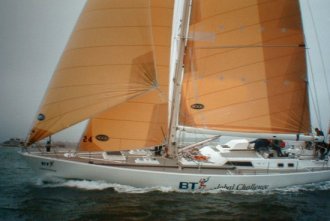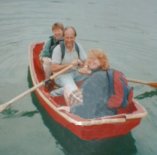

Two years before, when I had sailed the Solent single-handed I had been appalled by the 'performances' on VHF Distress and Calling Channel 16 each afternoon. Every boat name you could imagine seemed to be calling every other, continuously and without waiting for any possibility of a reply. The clear, hot August weather was bringing in a French CROSSMAR operator clearly. "Go home you bloody...ck off, Frog...can't speak Engl...up your French..." was the unanimous Solent response to this atmospheric anomaly.It took the full might of the coastguard's powerful FM transmitter to beg for quiet before we could all hear another little voice describing his severed finger and a request for immediate assistance...
We spent three days in the Isle of Wight (see the previous two pages, 1 and 2). Our overland trip to the Needles to see their might and majesty by daylight had been foiled by fog so thick that we could not see the rocks from the land either!
Radio traffic on Channel 16 was not at a very high pitch on the dull, drizzly May morning when we set off across the water for Southampton on the English mainland. The fog had thinned to the point where we could almost see the far coast of the Solent but the wind was still Force 5 - 6. We only needed the staysail to find our way from buoy to buoy at 5 knots.
I stuck closely to the rule-book by standing on, maintaining course and speed, when we had right of way over a similar sized yacht to ours emblazoned with the colours and logo of a well-known Solent sailing school. I imagined the instructor would be giving a concise if hasty explanation of the situation to his charges before taking avoiding action. Not a bit of it. They simply stood on too and we had to make the last minute manoeuvre that avoided collision. We did get a mumbled apology from one of their company as we passed behind, but I don't know what was going on there.
We tied up in Ocean Village Marina at 13:05, exactly four hours after leaving, having covered 21 nautical miles. Ocean Village turned out to be a very friendly place with a pleasant and busy yacht club and easy walking access to the middle of Southampton. Southampton is a big town with excellent bookshops and loads of others shops too.
Chay Blythe's round-the-world-challenge fleet were all tied up in Ocean Village. They were in the middle of their training period before setting out on their enormous race. One afternoon I walked slowly up and down the quay studying the fleet of beautiful steel yachts and their fittings. The cockpit of one boat was full of earnestly bowed backs as a serious discussion took place involving the full crew. I couldn't hear what anyone was saying and I imagined some of vital issues that could be under examination there.

Just as I strolled back towards them ten minutes later, they all sat back with smiles on their faces, the problem apparently solved. One of their number stood up, rubbed his hands and said, "Right, well let's go and do it, then."
Do what? I had to watch. They swarmed to the foredeck and unclipped a spare halyard each from the guard rails, re-clipping them all to a square metal loop provided for the purpose in the centre of the deck. I looked along at the other identical boats and that was where they all had their spare halyards clipped. They smiled and congratulated each other on a good job well done.
Team-building? Management training? Utopian democracy? Who cares? I wish our foredeck was big enough for it to matter.
After two days we sailed out into Southampton Water in a hefty Force 6, heading for home. It was Friday afternoon at about 17:00. We had a storm staysail up and the first reef in the main. The state of the tide meant that we would leave the Solent via the broad Eastern end, past the Nab Tower. We arrived at the Nab half-an-hour ahead of my plan and all looked good for a 26-hour crossing.
Once out into the open channel we unrolled the narrow yankee jib, hardened our sheets into the South-Wester and laid a course for the Alderney race. The wind-vane steering does a marvellous job of holding a course to windward and we settled down to 18 degrees of heel and 5.9 knots of boat-speed.
The midnight BBC shipping forecast said, "SW 4-5 occassionally F6 at first" so all was well there. At 01:30 we tacked to avoid a large ship, one gleaming green eye to our port. There is nothing to be gained by even thinking about rights and regulations on a dark night in connection with long-distance shipping: just get out of their way. We made some Westing first, then tacked back to the South at 04:00.
The dawn was grey but welcome. Land was nowhere in sight, the wind was still 17 knots and we ploughed on at 6 knots into it. By lunchtime it was becoming clear that somewhere along the line we had got behind schedule. We should have been entering the Alderney Race but were still many miles away from it. Perhaps I had miscalculated the contrary currents in the Channel, who knows. By the time we entered the Race it was just turning against us. The wind was up to 20 knots again and our speed over the ground was falling with every passing minute.
By this stage we must have found our sea-legs because we quite happily accepted the situation and began to prepare a substantial tea to see us through the delay. By 20:00 we were going backwards over the seabed while we sailed forwards through the waves. It was midnight before we were making good progress again, but the wind had fallen to Force 3.
 During that second night we spent a while looking for the important Desormes Buoy, North of Jersey. Tiredness was beginning to catch up with me. I found that wherever I looked, I could make towers, chimneys and sky-scrapers appear anywhere I liked on the horizon. If I was to see a navigation buoy I had to see it quickly or it would be lost in the hallucionatory towers that grew as soon as I concentrated my vision! None-the-less the buoy appeared dead ahead as expected. We negotiated the island and finally arrived at our home mooring at 05:30 on the third day of our crossing. We tied up only to find that our trusty plywood dinghy was sunk on the mooring. It took nearly another hour to bail and pump it out. I didn't want to leave it in case the pressure of water inside did some structural damage when the tide went out and it had to settle on the mud. We didn't need it, we went straight to bed aboard and slept the sleep of the just and the safe.
During that second night we spent a while looking for the important Desormes Buoy, North of Jersey. Tiredness was beginning to catch up with me. I found that wherever I looked, I could make towers, chimneys and sky-scrapers appear anywhere I liked on the horizon. If I was to see a navigation buoy I had to see it quickly or it would be lost in the hallucionatory towers that grew as soon as I concentrated my vision! None-the-less the buoy appeared dead ahead as expected. We negotiated the island and finally arrived at our home mooring at 05:30 on the third day of our crossing. We tied up only to find that our trusty plywood dinghy was sunk on the mooring. It took nearly another hour to bail and pump it out. I didn't want to leave it in case the pressure of water inside did some structural damage when the tide went out and it had to settle on the mud. We didn't need it, we went straight to bed aboard and slept the sleep of the just and the safe.